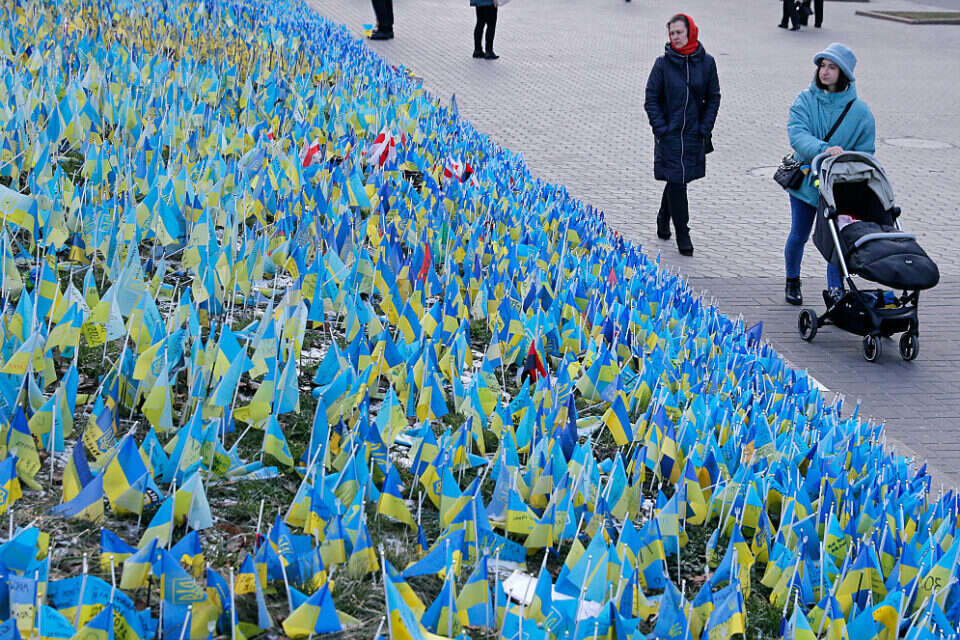One of the basic assumptions behind the Russian invasion of Ukraine a year (less than a day) ago was the concept that Ukraine is not a real country, but "an invention of Lenin", as Russian President Putin likes to tell, and that the Ukrainians are not really a separate people, but part of what Russia likes to call "the nation The one with three faces" (alongside the Russians and Belarusians).
However, at least for the Ukrainians, who may have still partially believed in their proximity to the Russians, the invasion became a watershed, an event that what was before it could not repeat, and set in motion a long series of cultural changes, with expressions that cannot be missed even at the everyday level.
For example, many Ukrainians, who previously spoke Russian at home, consciously decided to switch to Ukrainian.
A survey on the subject conducted in the summer revealed that the proportion of Russian speakers at home had shrunk to only 18%.
For comparison, just nine years ago this rate was 40%.
But language is only part of the story.
From the first weeks of the war, Ukraine was swept by a tsunami of changing names for places and geographical sites.
Any name that was associated with the Russian Empire or the Soviet Union was no longer considered legitimate.
For example, Moscow Boulevard in Kharkiv became "Heroes of Kharkiv" Boulevard.
Removing the statue of Pushkin in the theater of Chernivtsi, photo: the local council of Chernivtsi
A similar fate befell statues and monuments related to the Russian Empire and the Bolsheviks.
Statues of Empress Ekaterina in Odessa and Soviet General Nikolai Vettin in Kiev, and countless statues of the Russian national poet Alexander Pushkin, were removed.
The removal of the statue of General Vetotin in Kiev, this month.
De-Sovietization, photo: E.P.I
Just to illustrate: before the war there were no less than 100 streets named after him in Ukraine.
However, with the invasion, many remembered the poem "To the Slanderers of Russia", which he wrote in 1831 on the occasion of the "November Uprising" (also known as the "Cadet Revolution").
In the poem, Pushkin defended the tsarist oppression in Poland, and demanded that the West (mainly the French) not interfere in the "family feud" between the Slavs - not a faint echo of this can be heard in Putin's rhetoric.
The Eiffel Tower is illuminated in the colors of the Ukrainian flag, today (Thursday).
Wide support in the West, photo: AFP
Since the invasion, the Ukrainians have enjoyed high levels of support among the nations of the Western world, and this has many manifestations - from the huge demonstrations of support at the beginning of the war to the Ukrainian flag hanging on government buildings in the European Union;
From a small flag that appears on the background next to the result in the broadcasts of the Spanish league, to the surprising statistic published last month by the language learning application "Duolingo": Ukrainian is the trendiest language in the world.
And how have the Ukrainians themselves changed?
One of the most striking things was the discovery of national power, one of its manifestations was in countless memes that presented Ukraine as David versus Goliath, and made fun of Russia in general and Putin in particular in every possible way (see examples).
Putin ran into the wrong balloon.
One of the pro-Ukrainian memes in the war (more examples at the end of the article),
The director of the Institute of Demography and Sociological Studies at the Ukrainian Academy of Sciences, Dr. Ella Livnova, recently estimated that the basic values of Ukrainians have not actually changed, but only their behavior and self-esteem. "For 300 years, Ukrainians have felt second-class," she told the website Fakty It changed after the Ukrainians stopped the second strongest army in the world."
Vadym Denisenko, CEO of the Institute for the Future, Kyiv,
Whereas Vadym Denisenko, director of the "Institute for the Future" (Institute for the Future) in Kyiv, believes that Ukrainians have grown up all at once.
"A year ago, the whole country sat in front of the screens and enjoyed watching the politicians curse each other," he told Israel Hayom.
"Now they say: they don't want it anymore. We have also become much more pragmatic.
"The second significant change concerns the attitude towards the state. One of the main problems of our society was the chasm that separated it from the state. The state separately and the citizen separately. Now, the bulk of the nation said: I am the state. The responsibility is mine. And perhaps the last thing that stands out is the change in relation to Russia . Even after 2014, there were those who accepted Putin's view, that we are actually brothers or one people. After Bocha, everyone understood: we are not even relatives."
David vs. Goliath - or Jerry vs. Tom,
In Russia, Zelensky was mocked - and continued to be called "the comedian".
Hmmm wondering if the comedian and who is the joke,
So who is better - Volodymyr (Zelensky) or Vladimir (Putin)?
pro-ukrainian meme,
were we wrong
We will fix it!
If you found an error in the article, we would appreciate it if you shared it with us

